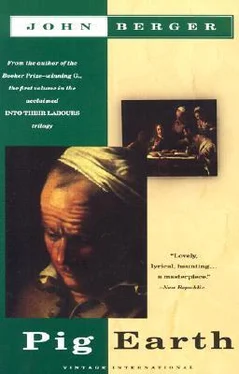“What sort of noise was it?” interrupted Martine. “Did you hear it?”
“Yes I heard it.”
“Were you asleep?”
“No.”
“Then what sort of noise was it?”
“A noise like somebody trying to break through the floorboards. I thought it was you. I couldn’t hear your voice. Something’s happened to the Patronne, I said to myself. She needs me. I’m going down to her.”
“See what you can see outside.”
He walked out briskly, no longer shuffling, a man with a purpose.
“It’s as calm as a lake,” he announced when he came back. He had the habit of using turns of phrase quite inappropriate to the place or occasion, as if referring to something in his own past.
“It’s a mystery,” she said.
“I can tell you it was Rousa.”
“I was dreaming of Rousa when the crash woke me up,” said Martine.
The old man stepped closer. His brows, his temples, the bridge of his nose were wrinkled like the skin of baked milk. For a moment she hesitated, as if she were going to ask him something. Then apparently she decided against it. His past remained a secret not because he refused to answer questions — he always answered — but because the questions were bound to be wrong.
“Yes, I was dreaming. We weren’t in the chalet here, we were down below. I’d gone to bed in the kitchen. This was in my dream. But earlier I’d asked you to help me push the bed, it was the big bed in our bedroom, the bed in which the Patron was born, to push it at an angle to the window. We pushed it together. This was to stop Rousa jumping out. The placing of the bed was a kind of barrier. Yet when I woke up I knew that Rousa had gone.”
“Most dreams are foolish,” he said.
Next morning, whilst he was taking the cows up to graze, she examined the stable to see if she could find any sign of what had woken them in the night.
Joseph’s complaint that women always complicate work was unjustified. After ten summers in the alpage, the two of them did not have to discuss what needed to be done each day. He went out with the cows and goats; he brought them in; he cleaned the stable; he cut the wood; he looked after the horse. He treated the horse as if it belonged to him and not to the Patron. Perhaps this was by virtue of age, for the horse was thirty and he was seventy-six. “By the time of horses,” he said, “he is older than me.” Martine milked, churned the butter, made the cheeses, cooked for them both.
Now she examined the walls of the stable, the doors at either end, the wooden gully down which he shovelled the cow shit through a hole in the wall, the beams which were so low that he had to bend his head and she could just walk under, the manger and the chains for fastening the cows, and she found no clue to what it was that had woken them.
She went up to the loft. Nothing had fallen. The hole in the hay where he slept was deep. His few clothes were hung over a beam. As she was about to leave, she noticed the broken neck of a wine bottle just within reach of the hay. She knelt down to look for the rest of the bottle but found nothing. On her knees she could see between the floorboards.
She returned to the stable, lifted up her skirt and stood astride the wooden gutter into which the cows piss. Whilst relieving herself, she looked up. The floorboards over Rousa’s place were gashed and one was completely split.
When he came back, she showed him the gashes in the wood.
“That’s just below where I sleep,” he said, “I tell you she has turned mad.”
“How could she butt if she was chained?”
“When a cow turns mad, you’d be surprised what she can do. She can leave her skin and go right back into it again.”
“Perhaps the gashes in the wood were there before.”
“They could have been.”
“Then what made the noise?”
“Rousa!” He screwed up his whole face because she would not see what was clear.
A few days later the cow tried to mount him.
“I saw her coming from behind. I was lucky enough to turn round and see her coming. She was charging down the hill and her forelegs were leaving the ground! She could have broken my back, five hundred kilos landing on it like that. Seventy-six years my back has kept me on these legs and they are not bad legs.”
“What did you do?” Martine asked.
“They are the legs of a man.”
“So what did you do?”
“I ran to the side and lay down.”
“Lay down?”
“On the ground. So as not to give her a target. Not even a cow, turned mad, can mount a shadow on the ground.”
She slapped her lap in amusement. They were sitting at the table finishing their soup.
“You are as thin as a shadow anyway.”
His shoulders were large, but the rest of his body always looked hidden within the folds of his clothes.
“I knew I was safer on the ground.”
“She might have trampled on you.”
“If she’d mounted me, she’d have broken my back.”
“God forbid!”
“I’m old, I’m nearer the big hole than the little hole through which I came into the world.”
“But the little one still interests you!”
“Tomorrow I’ll go down,” he said, admitting no complicity and drinking the water out of his glass, “tomorrow afternoon.”
“You can take the cheeses,” she said.
He was quite content to sit in the darkness, smoking a cigarette and occasionally going to the door to spit. But the darkness irritated her unless she was in bed. If she was sitting up, she wanted to read. The books she liked best were about other parts of the world: China, Paris, Tahiti. Joseph’s face was now barely discernible in the darkness. The lines and pouches on the faces of the other old people in the village could be allotted to events and experiences which were dated and recountable in detail; his remained mysterious, unrelated to any story, like the lines on the bark of a tree.
“I was thinking,” he said, “she may have smelt me where I was sleeping above her.”
Martine nodded. In the silent stable the cows were lying down. Outside, the mountains were reeling under the stars. That night Joseph went out of the room with one of his dance steps.
She took off most of her clothes. The two of them shared one broken piece of mirror, the size of a playing-card, which hung on the wall outside the door. In the mornings she did her hair in front of it, and once a week he shaved before it. Nobody in the alpage knows what they look like. She was standing in her bare feet when he came back.
“I tell you she has turned mad,” he said.
“Never mind, Joseph, if you’re right, we’ll sell her in the autumn.”
She climbed on to the wooden platform and bent double because of the low ceiling. From where he was standing he saw her white shape, vague but full like a cumulus cloud, trailing white legs.
“I’m not going to sleep in the same corner,” he said, “it provokes her.”
“You must do what you think.”
“It might be best for me to sleep outside. She can smell me.”
“Come, Joseph, you’re not a bull.”
“An old one, a very old one.”
She laughed lightly from the depth of the wooden room.
Before he went down the following afternoon, he mumbled to her that she should keep an eye on the cows. Perhaps one of the reasons why the old are so rarely obeyed is that they insist so little on the truth of their observations, and this is because they see all such particular truths as small, compared to the immense single truth about which they can never talk.
When he returned with three loaves and five bottles of wine his eyes had a wide tearful look. This meant that he had drunk a bottle during the two-hour climb up. He went to fetch the cows and staggered once or twice against the slope, as if falling into the open arms of a new friend. Yet when he came back with only five cows, a quarter of an hour later, he was quite sober.
Читать дальше












